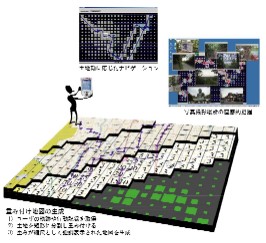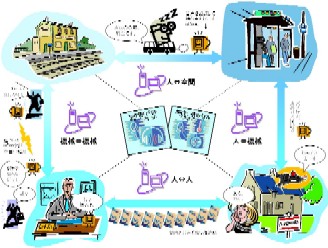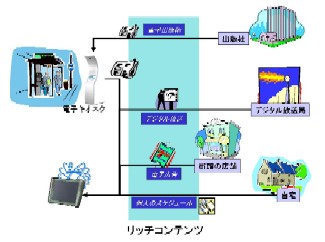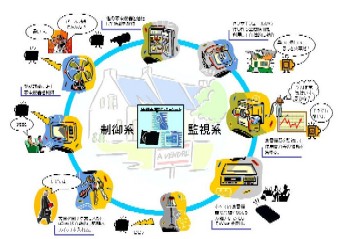Ubiquitous Computing & Communication Laboratory
* This laboratory has been completed.
| Date of establishment | April 1, 2003 |
|---|---|
| Director |
Jin Nakazawa
|
| Contact |
Keio University Shonan-Fujisawa Campus Delta building S213
Tel:+81-466-47-0836 |
Objective
The Ubiquitous Computing & Communication Laboratory (hereinafter called this laboratory) performs research and development on basic information and communications technologies for the ubiquitous society which will become increasingly important in the future, as well as R&D for new ubiquitous applications, create new business models and conduct research on the social impact of these through joint verification experiments with corporations participating in these efforts. This laboratory is striving to serve a central role in research and development related to the ubiquitous computing environment in Japan.
Members of this laboratory are participating in the Research Project on the Ubiquitous Information Society Resulting from Crossover Science being sponsored by the Ministry of Education, Culture, Sports, Science and Technology, and in April 2003, the Special Interest Group on Ubiquitous Computing System was established at the Information Processing Society, at which these members are playing a central role. Furthermore, a large scale research and development project concerning ubiquitous networks in which the Ministry of Public Management, Home Affairs, Posts and Telecommunications is playing a central role started in April 2003, indicating the height of demand for research and development in this area.
Seamless integration of cellular technology, information and home appliance technology, device integration technology, mobile technology and other areas in which Japan excels, realization of a new ubiquitous computing environment, and the creation of research groups on the ubiquitous society are highly important in maintaining the superiority of the advanced SFC information environment.
Research plans
The Smart Space Lab (SS Lab) is a source of research and development for this laboratory. This lab is conducting research on an information environment where computers that collaborate with one another are embedded in places that are not apparent called “Smart Space”, in addition to PCs and PDAs people currently utilized by people, and facilitating intelligent processing which is not possible with these devices.
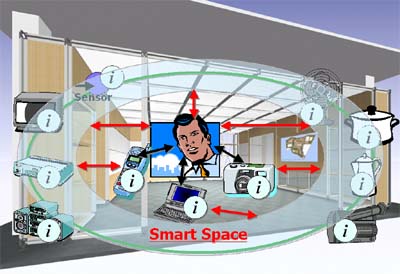
The SS Lab was established as one section of the ubiquitous computing environment. This laboratory is currently involved in the following areas of research in order to simplify the creation of this type of environment in convenient locations.
– Ubiquitous Open Platform
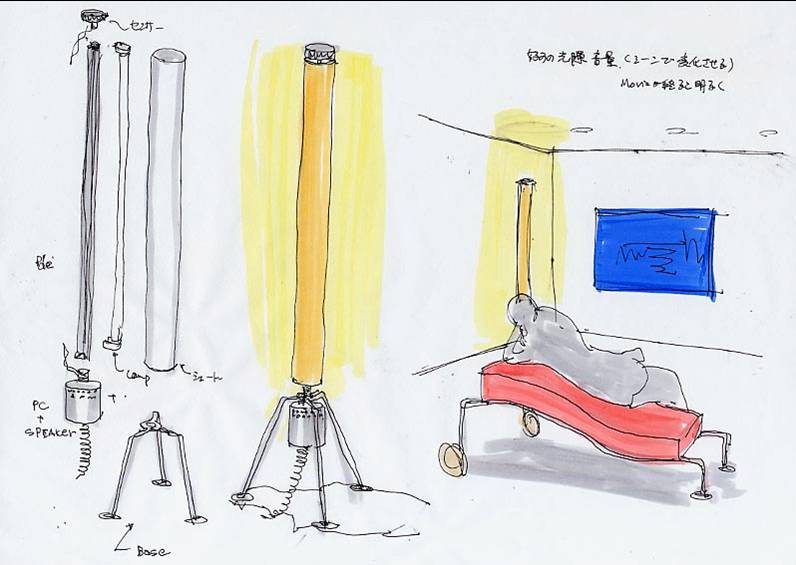
Research and development is performed on service platforms and mobile platforms as “tools” for creating a ubiquitous computing environment. A service platform is a tool to provide ubiquitous computing services such as sensing, actuation and networking by installing this platform in private spaces such as the home and the office, as well as public spaces such as stations, bus stops and parks. The diagram to the right shows an image of a service platform installed in the home that is based on the shape of a light. Therefore, the service platform installed in the home will serve as a “tool” for the creation of a ubiquitous computing environment. Service platforms located in public spaces will host advertising, broadcasting and other public services. A mobile platform is a tool that people take with them in order to utilize the services hosted on service platforms. An open platform is needed in order to enable smooth addition and modification of hardware and software by both industries and academia in order to promote research and development of applications for these platforms in a variety of situations.
– Ubiquitous Base Software
The ubiquitous network environment must have software that serves as the base environment for the dynamic connection of the above platforms, is able to receive input from users for services provided in this environment, and feed back output that is generated by these services. We are involved in the following types of research to enable an integrated solution to these issues.
| Network Service Technology |
|
| Status Recognition Technology |
|
| Service Roaming Technology |
|
| Ubiquitous Interface Technology |
|
– Ubiquitous Applications
Application software is being developed as a service technology in the smart environment that uses service platforms and mobile platforms. In addition to technology that automatically controls information devices to make services more “convenient” for users, research is being conducted on technology that focuses on providing a variety of value added information for the people that use the ubiquitous computing environment in order to make the services more “enjoyable”. In particular, transportation, medicine, publishing and broadcasting have been established as the main targets, and work is being performed on the application of existing applications for home appliances, advertising, disaster preparedness, information and other fields, as well as the development of new services. A sample of the services under development is shown in the diagram.
|
Ubiquitous Map Service
|
Ubiquitous Mobile Service
|
|
Ubiquitous Viewer Service
|
Ubiquitous Home Service
|
Researchers, managers and professors
| Jin NakazawaDirector | Associate Professor, Faculty of Environment and Information Studies |
|---|---|
| Yasushi Kiyoki | Professor, Faculty of Environment and Information Studies |
| Jiro Kokuryo | Professor, Faculty of Policy Management |
| Yoshiyasu Takefuji | Professor, Faculty of Environment and Information Studies |
| Kazunori Takashio | Associate Professor, Faculty of Environment and Information Studies |
| Takuro Yonezawa | Project Assistant Professor, Graduate School of Media and Governance |
| Tadashi Okoshi | Project Assistant Professor, Graduate School of Media and Governance |
